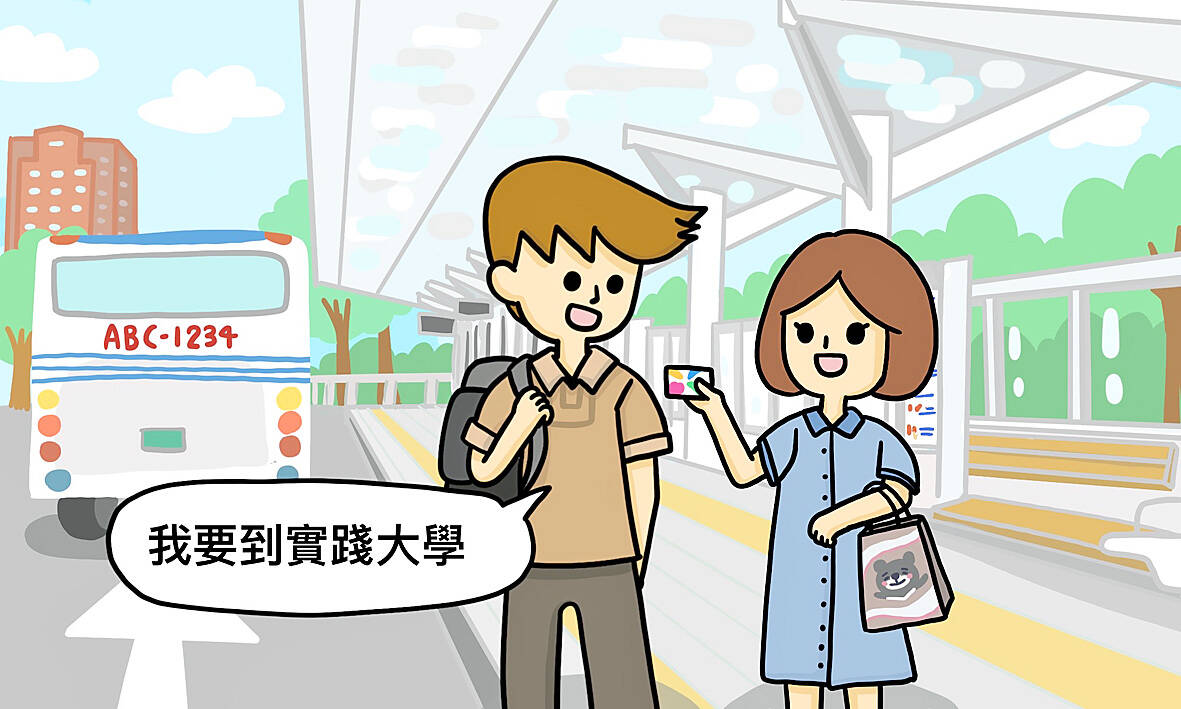對話 Dialogue
馬克:您好,請問這個公車站牌是往大直的方向嗎?
Make: Nín hǎo, qǐngwèn zhège gōngchē zhànpái shì wǎng Dàzhí de fāngxiàng ma?

路人:是啊,你要去哪裡?
Luren: Shì a, nǐ yào qù nǎlǐ?
馬克:我要去實踐大學。
Make: Wǒ yào qù Shíjiàn Dàxué.
路人:你可以坐247號公車到大直國小站,下車後走五分鐘就到了。
Luren: Nǐ kěyǐ zuò 247 hào gōngchē dào Dàzhí Guóxiǎo zhàn, xiàchē hòu zǒu wǔ fēnzhōng jiù dàole.
馬克:好的,謝謝你。請問我要怎麼買公車票?
Make: Hǎo de, xièxiè nǐ. Qǐngwèn wǒ yào zěnme mǎi gōngchē piào?
路人:你有零錢或是悠遊卡嗎?
Luren: Nǐ yǒu língqián huò shì yōuyóukǎ ma?
馬克:零錢和悠遊卡我都有。
Make: Língqián hàn yōuyóukǎ wǒ dōu yǒu.
路人:那你可以上車投15塊錢,或是上、下車都刷一次悠遊卡。
Luren: Nà nǐ kěyǐ shàng chē tóu 15 kuài qián, huò shì shàng, xiàchē dōu shuā yícì yōuyóukǎ.
翻譯 Translation
Mark: Hello, is this bus stop in the direction of Dazhi?
Passerby: Yes, where are you going?
Mark: I’m going to Shih Chien University.
Passerby: You can take bus 247 to the Dazhi Elementary School stop, then get off and walk for five minutes.
Mark: OK, thank you. How can I buy a bus ticket?
Passerby: Do you have small change or an EasyCard?
Mark: I have change and an EasyCard.
Passerby: Then you can pay 15 yuan when you get on, or swipe your EasyCard when you get on and off the bus.
單字片語 Vocabulary
1. 站牌 (zhànpái) bus stop
2. 方向 (fāngxiàng) direction
3. 國小 (guóxiǎo) elementary school
4. 零錢 (língqián) small change
5. 悠遊卡 (yōuyóukǎ) EasyCard
6. 投 (tóu) cast, put
7. 刷 (shuā) swipe (a card)
教材音檔 Audio Files
教材影片 Video Files:
https://www.instagram.com/celc.nou_tw/guide/_/17999106352646292/
實踐大學華語中心提供
By Shih Chien University Chinese Language Center: https://chineseusc.com/

US President Donald Trump has renewed his ambition to take control of Greenland for national security reasons and questioned whether Denmark has any legal right to the Arctic island. The debate has revived scrutiny of how Greenland became part of Denmark, its current self-rule and path to independence, and Washington’s military footprint. HOW DID DENMARK GET GREENLAND? Greenland was inhabited by Inuit peoples from Asia and North America intermittently from around 2,500 BC. Around 985 AD, Vikings led by Erik the Red settled in southern Greenland, farming and building churches. Around the same time, ancestors of today’s Inuit arrived, living as hunters

Owls have long fascinated people with their distinctive appearance and mysterious habits. These nocturnal birds possess large, round eyes and a flat facial disc. Their feathers come in shades of brown, gray, or white, helping them blend easily into the darkness. The most remarkable trait of owls is that they can turn their heads without damaging blood vessels. Contrary to popular belief, they can only rotate their heads up to 270 degrees, not 360 degrees. Owls have 14 cervical vertebrae, which is twice as many as humans. This special physical structure compensates for their inability to move their eyes within their

AI-generated summaries are shaking up the media world. Tools like Google’s AI Overviews now provide users with direct answers above the search results, resulting in fewer people clicking on news links. For publishers who rely on that traffic to generate advertising revenue, this shift is hitting hard. The fallout is measurable. Many sites have seen a sharp drop in traffic since AI summary features rolled out. An analysis revealed that a news outlet that had once ranked first on Google lost up to 79% of its traffic when its link appeared beneath an AI-generated summary. Statistics also show that

A: Bloomberg just released its annual travel guide, titled “25 Best Places to Travel in 2026.” What were the best Asian destinations? B: There were actually six Asian hotspots: Taiwan’s Taipei, Malaysia’s Penang, Kazakhstan’s Almaty, Indonesia’s Rote Island, India’s Tiger Reserves, and Oman. A: With its mix of traditional food and modern cuisine, Taipei has become a rising food capital in Asia. B: As Bloomberg reported, “Taiwan is a place that bubbles up in culinary conversation because of its famed beverage, bubble tea, and its early adoption of modern night markets.” A: And Din Tai Fung has now